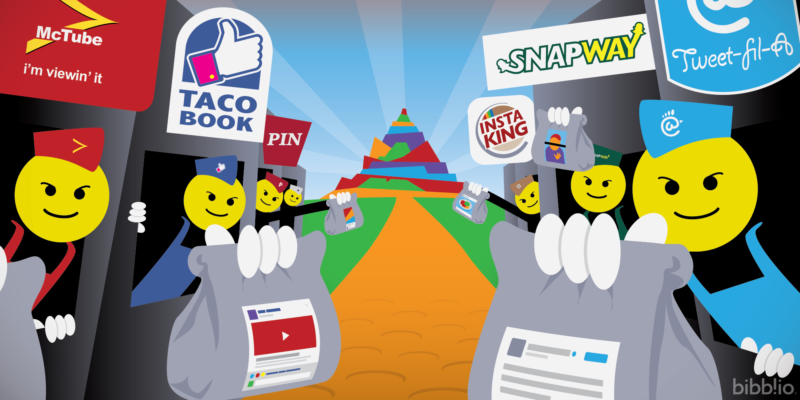Over the last decade or so, we’ve called the current state of affairs in the business world a few things:
- Sharing Economy
- Knowledge Economy
- Gig Economy
- Fourth Industrial Revolution
- Data-Driven Something Something
One you hear a little bit less, and should hear a little bit more, is “Attention Economy,” which has its own Wikipedia. (You know that’s vetted!) 60 Minutes, long a trusted news source of the Gen X and above yuppie set, even got into the game with an Anderson Cooper feature on “brain hacking,” which is essentially how Silicon Valley companies capture your attention.
Let’s set this whole thing up, then knock it down.
What is social media, really?
It’s people competing for attention.
“I got married, I had a baby, I have this viewpoint on global politics, etc.”
It’s just a giant Ferris wheel of attention-seeking at the most basic levels.
Now, we oftentimes think so so so so so many people are on social media, and that’s true to an extent. Half the damn world is on Facebook — although Facebook will erode in less than 10 years. (We all see that coming, right?) But Twitter? The number of active users on Twitter in the U.S. is less than a good episode of Saturday Night Live gets.
Try this: think of the 10 people closest to you in your life. How many are active on 2+ social networks? I think I got 4-6. “Active” is a stretch, but I could get to six probably. So about half? I bet most people would net there.
But still, social media has changed the world in numerous ways. And it’s just a giant quest for attention.
And what’s “content” anyway?
Also a quest for attention, and usually the attention of someone who can write a check for whatever you sell.
See, I do “content marketing” differently than most people. I try to write about shit that interests me. If you get interested in how I think, hit me up. I’ll write for you. But I will not bang you over the head with that. Make your own decision. I’ll be chilling over here in the meantime.
Most people call something “content marketing” and what they really mean is “channel sales through content.” It’s a giant lie.
But content is a quest for attention.
So now you have the supposed gasoline of the modern economy — social and content — as essentially big quests for attention.
How about data?
For data to have any resonance, it has to be used. It has to impact decisions in some way.
For it to be used, it has to command the attention of people. (Among other things.)
So now, data — another supposed engine of the modern era — is also about attention.
Why is all this a problem, then?
Well, first: attention spans in the first world have been dropping for decades.
So we produce more and more, but our time and ability to consume it is dropping.
That would be a supply-demand problem, right?
Second: digital noise is increasing, especially on the big five social platforms.
So now we’ve got more and more content, but less and less attention span, but more and more things flying around social — and remember, Facebook is a media company. People get news there. It may not be regulated as a media company, but it is one.
Oh, and now FB News Feeds are more about your friends/family (as they should be), so brands are big-time having to shift to “pay to play.”
Are you adding this all up, friend?
The Attention Economy is a bubble. It’s a harmful bubble too.
Think about Trump for one second
What did he do better than almost anyone?
Get attention for himself.
The media claims to abhor him, but their ratings were good when he was running or when he does crazy shit.
HRC was the first female ever on a major ticket — pretty huge deal — and couldn’t get more attention than DT.
Attention Economy.
Hey, who won that election?
Right.
Add the final wrinkle
Because of how algorithms work, we mostly see what we believe/like anyway.
This constant reinforcing of our own worldview and subset has led to a massive spike in confirmation bias.
So even if you want/crave/seek attention, it’s hard to actually get it if you need someone to come around on their thinking.
There’s a “latitude of acceptance” for any idea/product, sure — but if someone has just spent four weeks seeing only things they agree with and already understand, and you come around with a slightly different idea seeking attention, you ain’t going to win.
The Attention Economy is a giant bubble. It’s almost a race to the bottom.
Can we fix this?
Sure, but it’s not easy.
There are personalizations and apps you can use to only get certain types of news/information, but most people just use those to reinforce their own worldview anyway.
Algorithms make people money. As a result, they ain’t going anywhere.
The Attention Economy makes those who are good at it — Trump, Kardashians, etc. — money, and it’s not dying anytime soon.
But we’ve got stats about how nervous everyone feels these days, right?
Hard to look at those numbers and not think this:
The game today is about attention, but attention can only go to a very few. So what happens to those who seek the attention but never get it?
Doesn’t that seem like it’s going to become a larger societal problem in time?
Indeed.
Anyone got thoughts here, or is human nature already aboard this bullet train?

Yes, the feelings of loneliness and isolation are serious. I heard recently that the affect of loneliness is comparable to the medical effects of smoking a certain amount per day. Connecting in real life is still important!